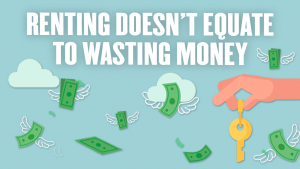Renting a property has become an increasingly popular option in the UK, as evidenced by the recent English Housing Survey conducted by the Government. This article debunks common myths about renting a home in UK. The survey revealed that over 8.6 million individuals choose to rent homes, encompassing both the social and private rental sectors. This figure represents approximately 36% of households, slightly surpassing the 35% of households who own their homes outright and the 30% who have a mortgage.
Although renting provides numerous advantages, it can be a complex realm to navigate due to the prevalence of myths and misconceptions. Fortunately, Nick Woodward, the lettings director at Essential Living, a property company, has dispelled some of the most common misconceptions surrounding renting a home in the UK. By shedding light on the realities of renting, he aims to empower tenants, equipping them with the necessary knowledge to make well-informed decisions.
1. Renting Isn’t Always More Expensive Than Buying

Contrary to popular belief, the cost-effectiveness of renting compared to buying is highly dependent on various factors. These factors encompass the prevailing housing market conditions, your geographical location, and the duration of your intended stay. It’s essential to bear in mind that the expenses associated with purchasing a home extend beyond the mortgage alone. They encompass additional costs such as property taxes, building insurance, maintenance, and eventual selling expenses, which can accumulate significantly.
When you opt for renting, you are relieved of these financial burdens and are solely responsible for paying your monthly rent. Additionally, you are not required to accumulate tens of thousands of pounds for a house deposit.
2. Renting Doesn’t Equate to Wasting Money
 Although paying rent may appear to yield no long-term benefits, this viewpoint disregards the numerous advantages of renting. Renting offers flexibility, as it doesn’t involve tying up your funds in a property and liberates you from the financial obligations and responsibilities of owning a home.
Although paying rent may appear to yield no long-term benefits, this viewpoint disregards the numerous advantages of renting. Renting offers flexibility, as it doesn’t involve tying up your funds in a property and liberates you from the financial obligations and responsibilities of owning a home.
In the present era, individuals no longer adhere to the traditional model of securing a lifelong job in their hometown and purchasing a house nearby. Nowadays, people often change jobs every few years, and renting provides the freedom to relocate as necessary. For many, the financial expenditure associated with renting is a worthwhile trade-off for the liberty to move about at their own discretion.
3. Landlords are Required to Give 24 Hours Notice Before Entering
There is a common misconception that landlords are always obligated to provide a 24-hour notice before entering a property occupied by a tenant. Although the Housing Act of 1988 ensures tenants’ right to enjoy their rented accommodation without disturbance, landlords may need to access the property to fulfill certain obligations. These obligations include conducting essential safety inspections like gas and electrical checks. Furthermore, landlords may also require access for conducting viewings when the current tenant is in the process of moving out.
While landlords must give written notice at least 24 hours in advance for these visits, they are permitted to enter the property without notice in exceptional circumstances. These circumstances include emergencies such as a fire, a strong smell of gas, or significant water leakage from the property. However, outside of these critical situations, tenants have the right to decline entry unless written notice has been provided.
4. Pets Are Permitted, Subject to Landlord Approval

While many landlords impose restrictions on keeping pets, it is not an absolute prohibition in all rental properties. The guidelines regarding pets can vary depending on each individual landlord, and some landlords are quite accommodating in this regard. Tenants should seek written consent from their landlord if they wish to have pets in their rented property.
Proposed government plans for rental reforms indicate that in the near future, all tenants will have the right to keep pets in their rented accommodation, provided they obtain written consent from their landlord. If a landlord refuses permission and the tenant believes the refusal is unreasonable, they will have the option to challenge this decision through the courts or with the assistance of a new Private Rented Sector Ombudsman.
However, owning a cat or dog in a flat necessitates additional considerations, particularly due to limited space. It is advisable to establish a consistent daily routine for walking and toileting, as well as rearranging furniture against the walls to maximize floor space for your pet to freely move about.
5. Rent Prices Can Be Negotiated

Contrary to popular belief, the listed rental price is not always fixed and unalterable. In fact, it is often possible to negotiate the rent, especially if you can provide positive references, demonstrate a stable income, and express your willingness to commit to a longer lease duration. Since rent prices can fluctuate and vary from month to month, letting agents may not always accurately determine the ideal price. As a result, there are instances where your slightly lower offer may be accepted, resulting in some cost savings for you.
6. You Have Freedom to Decorate and Make Changes within Reason

Contrary to common belief, as a tenant, you do have some degree of freedom to decorate and make changes to your rented home. While significant modifications typically require the landlord’s approval, many landlords are open to reasonable alterations, especially if they have the potential to enhance the property. Even if a landlord may not entirely endorse your choice of wall color, they are often willing to grant permission for decorating, on the condition that you restore things to their original state before moving out.
In response to the growing number of design-conscious renters, there is a thriving market for renter-friendly decor options that don’t involve permanent changes to your apartment. These include options like stick-on tiles or adhesive hooks for hanging artwork. It is always advisable to review your tenancy agreement or seek written consent from your landlord before embarking on any decoration projects.
7. Your Deposit Cannot Be Withheld by the Landlord Without Reason
It is important to note that landlords cannot retain your deposit without valid justification. They are only permitted to make deductions from the deposit for specific reasons, such as unpaid rent or the cost of repairing damages beyond normal wear and tear. Deductions from the deposit are intended to compensate the landlord for legitimate expenses incurred. If your landlord claims a portion of your deposit, it is essential to request a detailed breakdown of the deductions, accompanied by photographs of the damage and any relevant receipts for repair work.
Furthermore, deposits should be protected under a government-approved tenancy deposit protection (TDP) scheme, which ensures a fair process for both tenants and landlords. If your landlord fails to protect your deposit in such a scheme and provide evidence of doing so after you move in, you have the right to apply to your local county court. The court has the authority to order the landlord to refund the deposit to you or place it in a TDP scheme. In certain cases, the court may also require the landlord to pay you up to three times the amount of the deposit as compensation.
8. Rent Increases Are Not Unrestricted at the Landlord’s Discretion
It is crucial to understand that landlords do not have the unrestricted authority to increase rent as and when they please. The majority of tenancy agreements outline specific guidelines regarding when and how rent can be raised. In the case of periodic tenancies, landlords are required to provide adequate notice, and any increase must be fair and realistic, reflecting the local market conditions. Additionally, landlords cannot raise the rent more than once a year without obtaining your agreement.
For tenancies with fixed terms, your landlord can only increase the rent during the tenancy if you consent to it. Otherwise, the rent can only be raised once your tenancy comes to an end.
9. Renting Impacts Your Credit Score

Contrary to the past, renting now plays a role in determining your credit score. Since 2017, credit agencies have been authorized to consider rent payment histories when calculating credit scores. Timely rent payments can contribute to the development of a positive credit score.
To take advantage of this, tenants can register with a partner organization of The Rental Exchange. These organizations can verify regular rent payments and incorporate them into your credit report, enabling you to establish a favorable credit history and increase your chances of obtaining loans in the future.
10. Repairs and Maintenance Responsibilities for Landlords and Tenants
While landlords bear the primary responsibility for property repairs, tenants also have their own set of obligations. Generally, tenants are expected to uphold the property’s upkeep and perform minor maintenance tasks, including:
- Changing light bulbs and smoke alarm batteries.
- Maintaining a reasonable level of cleanliness and ventilation in the home.
- Keeping the garden well-maintained.
- Ensuring the safety of personal electrical appliances.
The specifics of your responsibilities as a tenant will be outlined in your tenancy agreement, providing detailed guidance on your role in maintaining the property.
